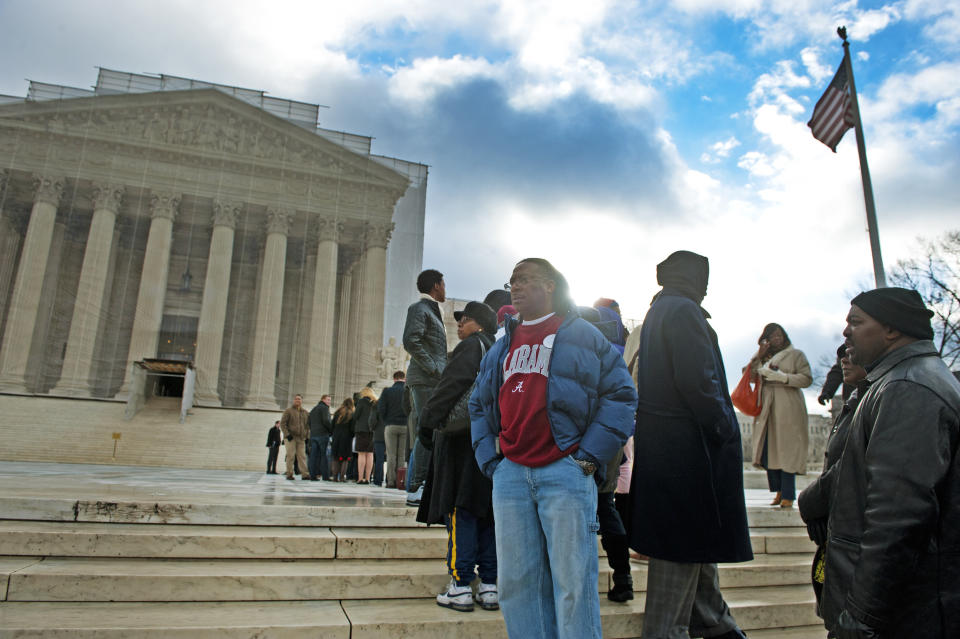A 2013 Supreme Court decision invited widespread voter suppression laws, experts say
The Black-white voter turnout gap in Alabama and other states has widened in the 10 years since the Supreme Court gutted part of the Voting Rights Act of 1965 that for decades restricted states from enacting voting policies that stanched Black voter participation, data shows.
In 2013, the court ruled 5-4 in Shelby County, Alabama v. Holder that Section 4 of the act was unconstitutional. This meant that the nine states and other smaller divisions once subject to what’s known as “preclearance” due to their histories of voter discrimination no longer had to clear changes to voting access rules with the federal government. Sections 4 and 5 of the act work in tandem to cover preclearance criteria and implementation.
The voter turnout gap has suffered as a result.
The Black-white voter turnout gap increased drastically, between 9.2 and 20.9 percentage points, across several of the preclearance states, according to a 2021 report from the Brennan Center for Justice. In Alabama, the gap increased by about nine percentage points between 2012 and 2022, according to the Brennan Center.

Rep. Terri Sewell, a Democrat and Alabama’s only Black member of Congress, described the impact of the ruling as “enormous.” She’s among advocates who say the Supreme Court’s Shelby County decision paved the way for several voter restrictions.
“We saw a flood of state legislators across this country institute more restrictive voter laws,” Sewell said.
Several state legislatures have passed laws restricting people’s access to the polls in the years since the Shelby County decision, including restrictions on mail voting and strict voter ID requirements.
Alabama is among the nine states — the others being Mississippi, South Carolina, Texas, Virginia, Georgia, Louisiana, Arizona and Alaska — that were required under the act to get federal approval before changing their voting policies or procedures. In the Shelby County majority opinion, conservative justices ruled that the low voter turnout of past decades was long gone, and voter “turnout and registration rates now approach parity.”
However, the Brennan Center, a public policy think tank, found that while the Black-white voter turnout gap closed in the 2008 and 2012 presidential elections, this was likely due to Barack Obama’s historic presidential nomination prompting a larger turnout of Black voters.
Sewell said that both the John R. Lewis Voting Rights Advancement Act, which she introduced and that the house passed in 2021, and the Senate’s Freedom to Vote Act are necessary to reverse the impact of the Shelby County decision. The Freedom to Vote Act would expand voter registration and voting access, limit removing voters from voter rolls, and make Election Day a federal holiday. The John R. Lewis Voting Rights Advancement Act — named after the civil rights leader and House member who died in 2020 — would establish new criteria for which states and political subdivisions would be subject to preclearance.
“The Freedom to Vote Act really has a lot of amazing opportunities to create greater voter access,” Sewell said. “The John Lewis voting rights act would remedy the Shelby decision by providing a modern-day formula to determine which states should preclear, the most egregious states that have a history of voter discrimination. We still do need federal oversight of states who have literally gone off the rails since the Shelby decision.”
Earlier this month, the conservative-majority Supreme Court unexpectedly affirmed part of the Voting Rights Act by striking down Alabama’s Republican-drawn congressional map. The Supreme Court agreed with a lower court that the state had diluted the power of Black voters by drawing just one majority-Black district, which Sewell represents, when the Black population was large and compact enough to warrant two majority-Black districts.
Sewell, who wrote an op-ed for Newsweek about the anniversary of the Shelby County decision, acknowledged this as a victory for voting rights, but said there is still much more work to be done. On Wednesday, she will join civil rights and voting rights leaders at the historic 16th Street Baptist Church in Birmingham, Alabama, to acknowledge the anniversary of the Shelby County decision and plan a path forward.
“As a person who leads voting rights efforts in Congress, as a daughter of Selma, it’s a no-brainer to acknowledge the anniversary of Shelby and assert what its impact has been,” Sewell said. “We should use this anniversary as an opportunity to recommit ourselves to the fight for voting rights.”
This article was originally published on NBCNews.com

